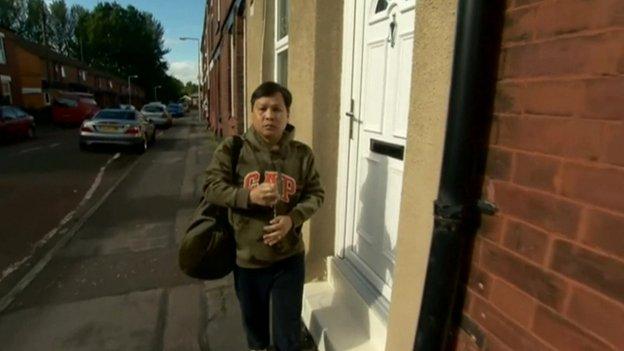Stepping Hill trial: The devil within Victorino Chua
- Published
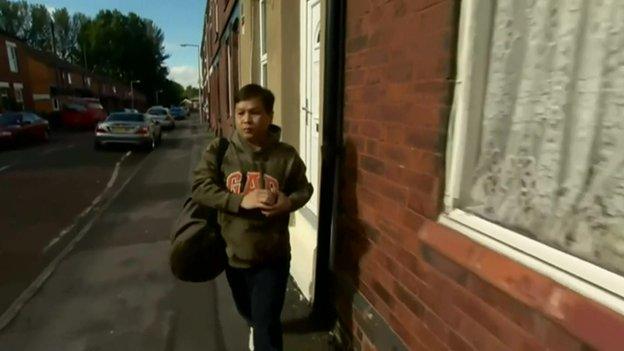
Victorino Chua "quietly dispensed of people" to exert power and control, according to psychologist Dr David A Holmes
Victorino Chua has been found guilty of murdering two patients by poisoning them at Stepping Hill Hospital in Stockport. But despite Greater Manchester Police's largest inquiry since the Harold Shipman murders, mystery still surrounds his motives.
Chua was meant to care for seriously ill patients but instead he became their poisoner and - in two cases - their killer.
He secretly injected saline drips and ampoules with insulin and then waited to see who was affected.
When security was tightened he changed tack, altering medical notes and increasing dosages - sometimes with fatal consequences.
A letter found at his home in Stockport provided the only clue to his state of mind.
"I'm evil at the same time angel," he wrote, referring ominously to "the devil in me".
"The bitter nurse confession," the letter continued. "Got lots to tell but I just take it to my grave."
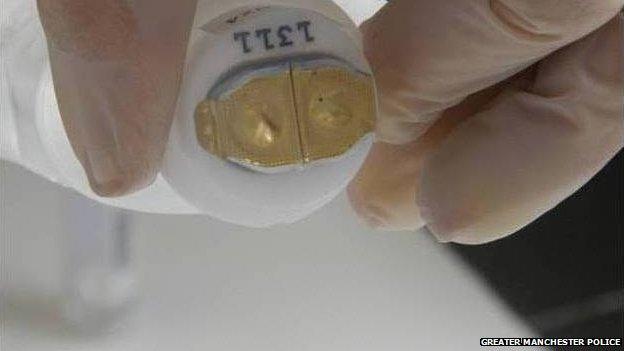
Chua used a hypodermic needle to infect saline bags and ampoules
The poisoning of 22 patients took place on two wards between June 2011 and January 2012.
Tracey Arden, 44, Derek Weaver, 83 and 71-year-old Arnold Lancaster all died while Grant Misell, 49, was left with a serious brain injury.
Chua was found guilty of murdering Ms Arden and and Mr Weaver and causing grievous bodily harm to Mr Misell. He was also convicted of the attempted grievous bodily harm of Mr Lancaster but was cleared of his murder.
On 10 July 2011, there had been a spate of five poisonings while Chua was working on the nightshift.
Patients suddenly fell ill, becoming very hot, pouring with sweat and feeling dizzy. They were suffering hypoglycaemic attacks.
Mr Weaver was poisoned that night.
Nursing sister Susan Brown, who was at work at the time, described the ward as "chaos".
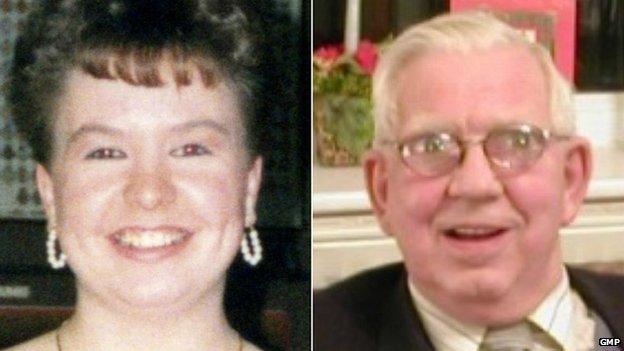
Chua was found guilty of murdering Tracey Arden and Derek Weaver
"I remember doctors wondering if the monitoring equipment was faulty, but I knew the patients were showing symptoms too," she said in a statement read out in court.
"I knew something was not right. It happened one thing after another. The doctors couldn't keep up."
Insulin was subsequently found in a batch of saline ampoules in a hospital storeroom. This sparked a major investigation.
Within two weeks, Greater Manchester Police had made an arrest.
Nurse Rebecca Leighton was initially suspected and spent six weeks in custody.
Her arrest was splashed across the front pages, accompanied by a photo taken from her Facebook page.
But Ms Leighton was innocent of the poisonings and was cleared of any involvement, although she was subsequently sacked after admitting stealing drugs and medicines.
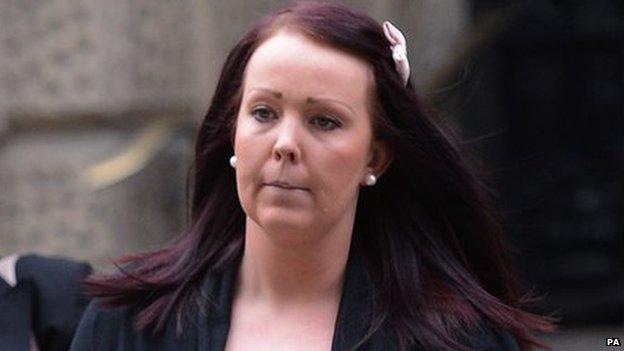
Rebecca Leighton spent six weeks in custody but was cleared of any involvement in the deaths
She later sued Greater Manchester Police for leaking her name to the press.
With Ms Leighton cleared, the Stepping Hill poisoner remained at large, and police inquiries would continue for more than three years.
The investigation was described by police as the "biggest and most complex case in a decade". In its early stages, there were more than 100 detectives working on the case and more officers were involved than tackled either the Shipman murders or the investigation into the 1996 IRA bombing of Manchester.
There was certainly a lot to examine - a single patient's medical records could contain several hundred pages.
Officers interviewed 1,177 people, including members of staff, patients and visitors.
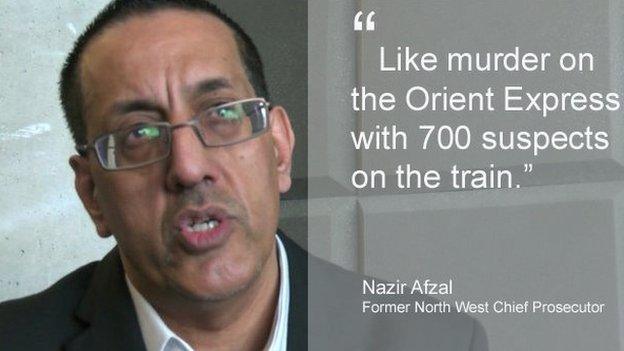
"This was, and is, probably the most complicated investigation, inquiry and prosecution I've dealt with in quarter of a century," former North West Chief Prosecutor Nazir Afzal said.
"This is like Murder on the Orient Express with 700 suspects on the train. You had to eliminate one by one and - as you eliminated one by one - Mr Chua always remained in the frame, so to speak.
"He was sadly in the wrong place at the wrong time for all of the victims. That made the case stronger and stronger. It took two years ultimately, through expert evidence, medical evidence, to build the case as we did as strongly against him."
Five other "suspect" nurses were investigated. On 5 January 2012, Chua became the second person to be arrested.
None of his fingerprints were found on any of the contaminated products and nobody saw him sabotaging anything.
Chua insisted he had done nothing wrong and the evidence against him was circumstantial.
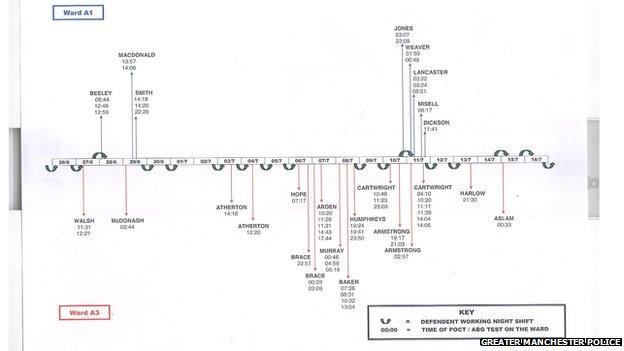
This graph shows wards A1 (top) and A3 (bottom) and the number of hypoglycemic incidents. Police said this 'pulse' diagram showed a noticeable lack of hypoglycemic incidents on ward A1 (top) when Chua was not working on that ward
He was bailed and that was extended a number of times until, in March 2014, he was rearrested and charged.
A key bit of evidence against Chua was a blood sample he took from one of his victims - Grant Misell.
He took the sample at 0600 BST and recorded the patient as being responsive and alert an hour later.
"Well he wasn't and that sample proved that," said Det Supt Simon Barraclough, from Greater Manchester Police.
"The sample showed Mr Misell was deeply in a hypoglycemic coma."
It was "as near a smoking gun as we've had in this investigation", he said.
The letter found at Chua's Stockport home was also a key piece of evidence against him.
Chua said the letter, which hinted at the depths of his troubles, was written to explain how "an angel turn to an evil person".
The 13-page document concluded: "Still inside of me I can feel the anger that any time it will explode just still hanging on can still control it but if I will be pushed they gonna be sorry."
Chua told police he wrote the letter after seeing a counsellor in June 2010. The court also heard he had been prescribed sleeping tablets and anti-depressants.
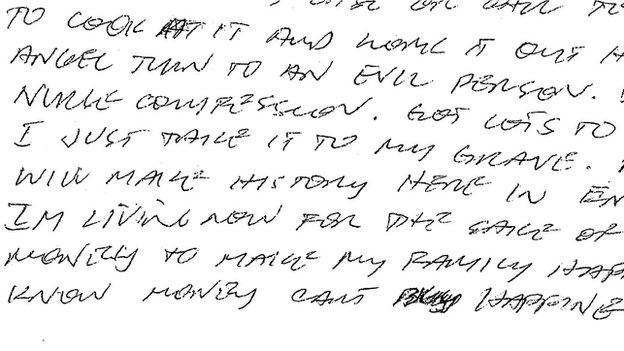
The court heard the handwritten letter was found in Chua's kitchen
Prosecutor Peter Wright QC said the letter was "in the form of autobiography".
"There was unfinished business. It is a narrative of his life, of his feelings, of his pent-up frustrations," he told the jury. "It was a portent of things to come and of what he had done."
He added that the poisonings were not "naturally occurring phenomena".
But Chua said the secrets referred to in his letter did not concern "illegal activity" at the hospital. He said they were instead about a girlfriend at a care home where he previously worked.
"I didn't want my wife to know because I was going to keep a secret to myself until I died," he said.
Chua said his meaning of evil was "doing the wrong things" and "not playing fair". He said this referred to his "dealing under the table" for car accessories. He told the jury he was a "scapegoat".
When accused of being the "common denominator" in all the poisonings, Chua said: "No. I'm the only one working 66 hours a week."
But David A Holmes, senior psychologist at Manchester Metropolitan University, said he believed the letter was Chua's confession.
"He's attaching it to his profession," he said. "He is wreaking some kind of vengeance, reinstating his own importance.
"There may be some kind of slight delusional thing going on. The idea that it is not him but something devilish or mythical within him controlling this.
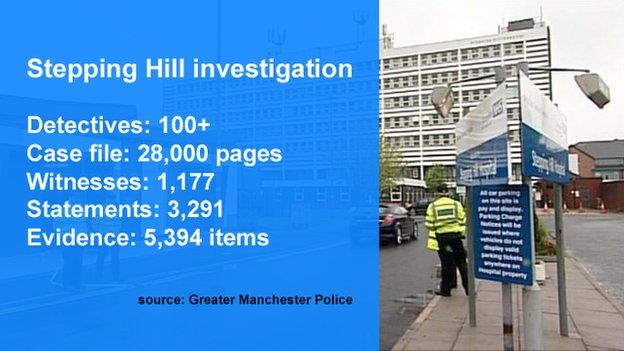
"This is a phenomenon attached to Munchausen's syndrome or factitious disorder by proxy.
"There is a sense of power, there is also an almost godlike sense, that being in control of these people in some way or another makes them superior beings."
Motivations, he said, included a "building hatred" for those getting more attention, a bid for "professional recognition" and "a major motivation... to be seen as the angel of mercy".
Dr Holmes said Chua was "in the same area" but a "different breed" to serial killer Shipman.
"Shipman was hyper-confident, overtly highly controlling, able to charm and disarm and had psychopathic features.
"If Chua has psychopathic features they are much more passive. Chua quietly dispenses of people."
To those who knew him, Chua was a quiet and gentle man. His first nursing job was at Manila Metropolitan Hospital in April 1991, where he met his wife in 1992.
In February 2002 the Chua family moved to the UK. He worked at care homes in Warrington and Salford before getting a staff job at Stepping Hill in 2009.
His neighbours Viv Garnett and Paul Catlow said they were "stunned" by his arrest.
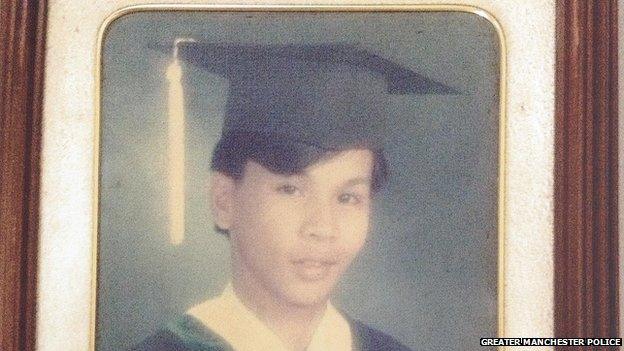
Chua grew up and was educated in the Philippines
"He was a very nice man, always more concerned with how other people were rather than himself," Ms Garnett said. "I just can't see it myself. Such a gentle, caring man."
Mr Catlow agreed: "You don't think anybody like that could be a mass murderer. There was absolutely nothing there to suggest anything odd about him."
A colleague, Angela Bryant, told the trial Chua was a "good nurse" although she had heard rumours he was being bullied.
"His attitude is really good, really gentle," she said. "I have not seen him lose his temper with staff or patients."

'Angels of death'
Nurse Beverly Allitt: During an eight-week period in Grantham, Lincolnshire in 1991 Allitt killed, attempted to kill, or seriously harm 13 children in her care
Dr Harold Shipman: Shipman was given 15 life sentences for murder in 2000, but police believe he may have killed up to 215 patients
Nurse Victorino Chua: Found guilty of murdering two people and poisoning 20 others at Stepping Hill

A friend of Chua's, who did not want to be identified, said the nurse was a hardworking, family man who came to the UK in search of better working conditions.
"I don't think he would be coming from 10,000 miles away to do this," he said. "He wouldn't ruin his family for that. I don't see any negative in him."
However, one person who recalled a different Chua, was Anna Dodd, the daughter of 86-year-old Maria Pawlyszyn, who was admitted to Stepping Hill on 2 January 2012.
Ms Dodd clashed with a "very rude" Chua over whether her mother needed a heart monitor.
She told the court when she spoke to a ward sister and Chua returned with a heart monitor he was "very angry" and "threw it" on a table.
Had Ms Dodd noticed what others could not see?
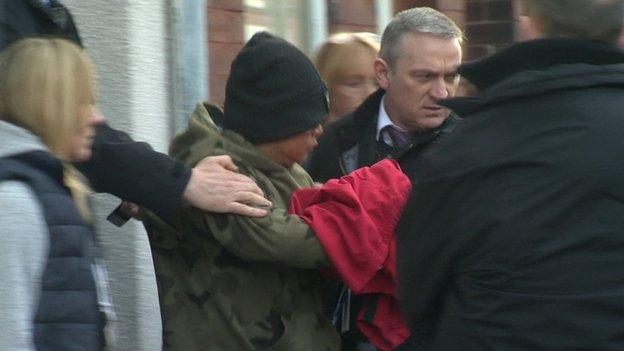
Police rearrested Chua at his Stockport home on 28 March 2014 at about 06:30 after his bail had been repeatedly extended
Later that day the prescriptions of seven patients, including Ms Pawlyszyn's, had been changed, the jury heard.
A hand-writing expert told the trial he believed someone had attempted to copy the doctor's signature but he could not say whether that was Chua.
Recommended drug dosages had doubled and trebled on Ms Pawlyszyn's chart. Another drug had been added which could have caused a heart attack.
Dr Holmes said the Stepping Hill poisonings may not have been Chua's first crimes.
"Unless something has suddenly precipitated these line of events, those feelings, those motivations will have been there for quite a number of years which does imply a rather insidious possibility that there may be a trail further back in the past."
- Published18 May 2015
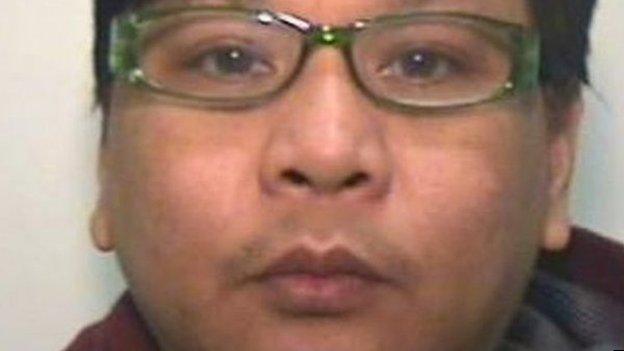
- Published18 May 2015
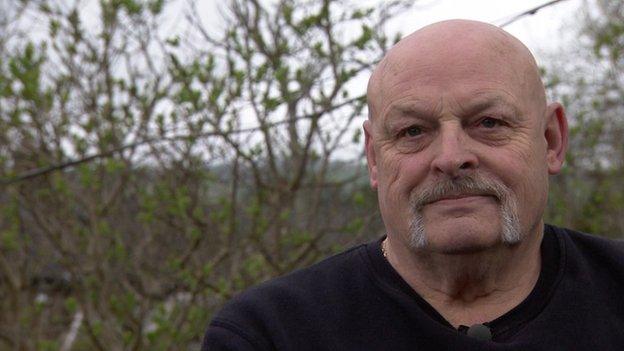
- Published18 May 2015
